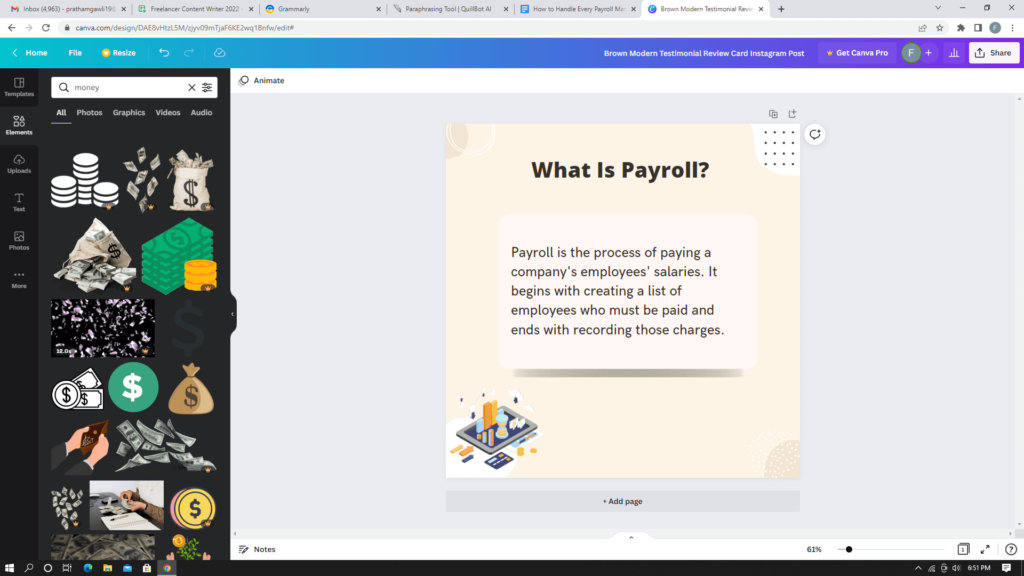Payroll management is a crucial business operation for every firm to simplify payroll processing, improve productivity and efficiency and enhance management. Besides financial stability, an effective human resource keeps a firm growing.
Although it appears simple initially, managing financial data, including employee salaries, incentives, bonuses, and deductions, is not as simple as it seems. However, many firms, and small enterprises, find it difficult to manage payroll management services.
Payroll processing has several challenges like pay structure, leave structure, company policies, and adherence to rules and regulations. Recognising problems in payroll processing is the first step toward identifying effective solutions. Continue reading to learn about common payroll issues and how to solve them.
Table of Content
What is payroll?
Payroll is the process of paying a company’s employees’ salaries. It begins with creating a list of employees who must be paid and ends with recording those charges.

It’s a complicated procedure that necessitates collaboration across departments such as payroll, HR, and finance. But, companies can manage all the complexities easily by selecting modern technology.
The time between two salary disbursements is referred to as a payroll cycle. Salaries might be paid weekly, biweekly, or monthly, depending on the company’s needs. In most nations, on average, it is processed once a month.

9 ways to ease your payroll management
We’ll go through the top payroll processing and management difficulties and strategies for overcoming them.
1. Manual payroll process
The first step is to go paperless with your payroll processing. It assists you in reducing the amount of time and resources spent on paper processing.
It is the ideal alternative if you seek ways to save costs while maintaining company data security.
Employees will receive paid promptly and correctly after switching to an electronic payroll system. There is no possibility of checks being misplaced or lost.
2. Safety and security issues
Keeping your company’s confidential payroll data secure is a significant matter that firms should take seriously. Even the most minor security compromise can result in your organisation losing critical assets and, more significantly, employee trust.
When payroll is processed manually, the danger of fraud is increased due to misleading commissions, fraudulent insurance claims, data mishandling, and information leakage.
One wrong click on the incorrect link might expose your entire payroll database to security risks such as phishing, social engineering schemes, or targeted cyber-attacks.
It’s critical to keep your payroll software up to date and patched with the latest changes, as well as to conduct regular payroll audits.
Implementing a cloud-based Payroll Management System which is perfectly safe, scalable, and seamlessly connected to provide easy control of finances and HR activities will ensure that control remains in the right hands at all times.
3. Payroll rules and regulations
Staying up to date on the latest rules and regulations is a vital part of handling payroll. Categorising the employee according to their role is one of the effective ways of managing the people at work. For instance, an individual working for a short term for a particular time can be categorised as an independent contractor.
The incentives, benefits, and tax withholdings that apply may differ from those that apply to regular employees. Thus, it streamlines the payroll processing of creating an employee account. Categorising the employee can easily help you classify them correctly under applicable rules and regulations.
4. Software non-compatibility issues
A Payroll Management System can perform various cloud-based functions, including collecting employee attendance data or records, tracking hours, sending salary payments into bank accounts, and acting as a self-service portal for employees.
However, if your organisation currently utilises different software to manage employee information, performance, or benefits, ensuring the payroll program’s compatibility with the rest could be challenging.
Your main priority as a business owner should always be to find ways to make your firm more productive and cost-effective in the long run.
Implementing a comprehensive cloud payroll software that integrates all HR and payroll processes and streamlines the entire process is a critical first step.
Perform monthly compliance audits and random database checks to overcome software non-compatibility problems.
5. High costs
There are numerous ways by which payroll can attract high costs. Organisations are turning to online platforms in the pursuit of more effective administration.
These systems now involve a significant initial investment and require the management of a dedicated person.
Platforms must be maintained and upgraded, which takes time and money. You’ll need to hire an in-house IT team to keep everything running correctly. You’ll also need to instruct your employees on complying with regulations and administering payroll and taxes.
So you can see how, even if done well, payroll management can be costly, and for most businesses, this cost is relatively high.
Outsourcing the process is one of the best ways to make your payroll management cost-effective.
6. Added burden
You and your employees have to face the added burden of handling payroll. It affects their ability to deal with other essential issues and impacts the organisation’s overall goal.
Payroll processing requires a lot of time in every firm, whether it’s accumulating data, validating the quality of the recorded data, complying with rules and regulations, or conducting intricate salary calculations. This is true even if the organisation has the necessary technological tools to process payroll properly.
Also, a business owner has a lot on their plate; adding payroll will leave many other essential responsibilities unattended.
The most practical option to effectively control the time spent on payroll configurations is to use an automated cloud payroll system for seamless payroll management.
7. Outdated payroll systems
It’s a well-known fact that repetitive, monotonous jobs hurt staff morale and productivity. Outdated manual payroll systems that rely on significant paperwork quickly become outdated.
Another issue with traditional systems is the difficulty of sharing reports even among departments within the firm and the inability to keep a backup of essential data for future use.
Your firm’s efficiency can be significantly increased by automating the payroll process and employing a specialist Payroll Management System.
An automated cloud-based Payroll Management Software will assist in resolving various payroll-related issues and pave the way for more innovative workplaces.
Another option to ensure such difficulties are handled effectively is outsourcing essential payroll processing operations to professionals in the field. Once you’ve done that, you’ll see that your internal productivity and in-house technology investment are becoming more effective.
Allowing more time for your key personnel, lowering payroll processing costs, ensuring better compliance with rules and regulations, utilising the technology of the outsourcing partner, reducing the possibility of errors cropping up, and reducing downtime for troubleshooting are just a few of the advantages of outsourcing payroll processing to professionals.
The last thing you want is to get caught up in a web of payroll-related complexity and issues as your firm evolves and looks for new methods to innovate its offerings, goods, or services.
8. Accuracy
Regarding payroll management, most organisations fail due to a lack of precision. And we all know that payroll accuracy is crucial.
The payroll process affects work in batches where regular updations happen. Then there are situations concerning incentives, bonuses, promotions, and other miscellaneous employee expenses, all of which increase the likelihood of errors.
All of this adds to the uncertainty and leads to mistakes that can negatively affect an organisation’s reputation.
Don’t make the mistake of manually processing payroll. Trust the professionals to eliminate errors and loopholes in the procedure. Individuals with experience will also be quick to spot and correct mistakes if they occur.
9. Backup systems
If the system fails and there is no solid backup, you don’t need to be a payroll expert to understand the extent of the disaster.
Consider having backup data or a complete replicated system in another physical place if you handle payroll on in-house systems to protect against risks like fire or theft. Your data should be automatically backed up in the cloud if you utilise a cloud-based payroll system, but be sure you select a reputable provider.

Final thoughts
Paying employees incorrectly or late can hurt their morale, and failure to comply with tax or labour rules can result in severe penalties. It should be done carefully because a single error can result in many issues.
Payroll management appears simple, including aggregating hours worked, calculating wages owed, distributing paychecks, and updating records. Yet, every organisation faces its unique set of challenges regarding payroll management.
Outsourcing Payroll Services London can surely assist in the better management of payroll processing issues. When it comes to overcoming payroll management issues, the greatest solution enterprises can use is automated cloud-based payroll management software managed by experts.












Leave a Reply